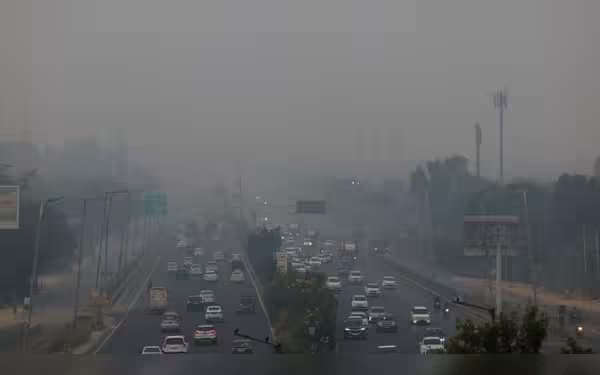Friday, November 8, 2024 03:44 AM
Toxic Smog Engulfs New Delhi as Winter Approaches
- New Delhi's air quality plummets to 'very poor' levels.
- Farm fires contribute significantly to pollution spikes.
- Delhi ranked as the world's second most polluted city.
 Image Credits: geo
Image Credits: geoNew Delhi faces severe air quality issues as winter nears, with toxic smog affecting public health and respiratory illnesses rising.
As winter approaches, the Indian capital, New Delhi, finds itself enveloped in a thick blanket of toxic smog. This annual phenomenon occurs when cold air traps pollutants close to the ground, leading to a significant decline in air quality. The situation is particularly alarming as respiratory illnesses tend to spike during this time, affecting the health of many residents.
The smog is a result of a dangerous mix of smoke, vehicle emissions, and dust. Major contributors include construction activities, vehicular traffic, and smoke from farm fires in the neighboring states of Punjab and Haryana. According to the earth sciences ministry, the air quality is expected to remain in the "very poor" to "severe" category for the next six days. On the air quality index, New Delhi scored a troubling 384, indicating that the air is not just unhealthy but poses serious risks, especially for those with pre-existing health conditions.
Recent data reveals that farm fires have significantly increased pollution levels, accounting for over 23% of the pollution on Monday, up from about 15% just a few days earlier. Alarmingly, about one-third of the city's 39 monitoring stations recorded a "severe" score exceeding 400 on Tuesday. This is a stark contrast to the ideal air quality score of zero to 50, which is classified as "good." In fact, a Swiss group, IQAir, has ranked Delhi as the world's second most polluted city, following Lahore in Pakistan, where authorities are also grappling with similar pollution challenges.
The Punjab government has pointed fingers at pollution drifting in from India, promising to address this issue through diplomatic channels. This situation highlights the interconnectedness of air quality issues across borders, emphasizing the need for collaborative efforts to tackle pollution effectively.
As residents of New Delhi brace themselves for the winter months, it is crucial to recognize the importance of clean air for public health. The ongoing struggle against pollution serves as a reminder of the urgent need for sustainable practices and policies that prioritize the well-being of citizens. Only through collective action and awareness can we hope to breathe easier in the future.













